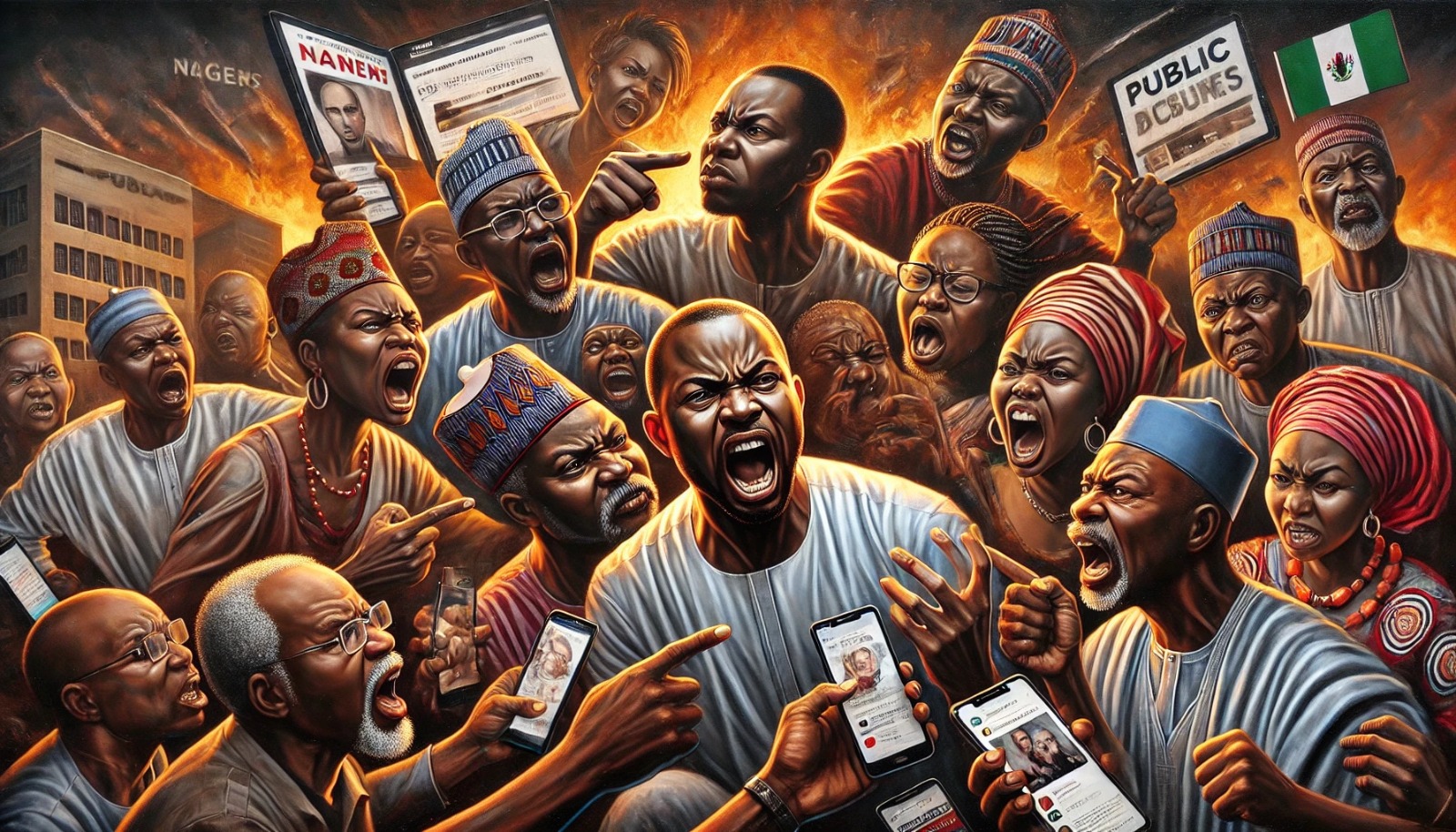The outrage industrial complex in Nigeria has become a defining force in the country’s social, political, and digital landscape. It refers to the systematic exploitation of public anger and discontent by individuals, institutions, and interest groups for political, economic, or social gain.
This phenomenon thrives on the amplification of outrage, particularly through social media, where algorithms prioritise sensational and polarising content, ensuring that it reaches millions within moments. In Nigeria, a nation with deeply entrenched ethnic, religious, and socio-political divides, the outrage industrial complex has found fertile ground, shaping public discourse and influencing governance in ways that often harm the very fabric of society.
At the heart of this complex lies the deliberate manipulation of public emotions. Politicians in Nigeria are masters at weaponizing outrage to advance their ambitions. During election cycles, campaigns frequently deploy inflammatory rhetoric that targets opponents along divisive ethnic or religious lines. For example, the 2023 general election saw the proliferation of incendiary narratives on social media, with supporters of various candidates spreading false accusations about rivals’ religious biases or involvement in corruption. These narratives were often not spontaneous but carefully orchestrated by political strategists and consultants who understood the power of outrage to sway public opinion. This form of manipulation stoked fear and anger among citizens, effectively distracting them from meaningful policy debates and critical national issues.
Traditional and digital media platforms play a critical role in perpetuating the outrage industrial complex. In a competitive media environment, sensational headlines and polarising narratives are more likely to attract readership and drive engagement than balanced reporting. Stories about conflicts such as farmer-herder clashes or communal violence are often framed in ways that highlight ethnic and religious divisions, rather than providing nuanced explanations of the root causes. During the EndSARS protests of 2020, for instance, media coverage frequently amplified sensationalist angles that fueled public confusion and mistrust. While the protests were driven by legitimate grievances about police brutality, the outrage they generated was also exploited by various actors with differing agendas, leading to the dilution of the movement’s core objectives.
The rise of social media influencers has added another dimension to the outrage industrial complex. Many influencers act as gatekeepers of public opinion, leveraging their massive followings to amplify outrage and position themselves as champions of the people. While some use their platforms for advocacy and activism, others exploit trending issues for personal gain. For instance, the emigration wave popularly referred to as “Japa” was amplified by influencers who presented Nigeria as a hopeless and irredeemable state. While emigration is a legitimate choice for many, the overwhelming focus on despair created an echo chamber of negativity, diverting attention from efforts to address systemic challenges. In such instances, outrage becomes less about problem-solving and more about fueling despair and cynicism.
The implications of the outrage industrial complex on the Nigerian society are far-reaching. One significant consequence is the erosion of trust in public institutions. When every government policy, action, or inaction is met with hysteria, often amplified by misinformation, citizens gradually lose faith in governance altogether. This distrust was evident during the COVID-19 pandemic, when skepticism about government policies, stoked by sensational content, led to widespread noncompliance with public health measures. Similarly, outrage deepens societal divisions, exacerbating existing fractures along ethnic, religious, and class lines. By framing issues in binary terms — North versus South, Muslims versus Christians, or rich versus poor — the complex reinforces mistrust among communities, making it difficult to build national unity or find collective solutions to pressing problems.
Another significant impact is the stifling of meaningful public dialogue. Outrage often drowns out reasoned discourse, reducing complex issues to oversimplified debates. In a country like Nigeria, where systemic problems such as unemployment, poor infrastructure, and educational reform require thoughtful engagement, the dominance of outrage ensures that such issues are rarely addressed with the depth they deserve. Instead, public debates are consumed by hyperbolic claims and emotional reactions, leaving little room for compromise or practical solutions. Moreover, the constant cycle of outrage has a numbing effect on society. When every issue is presented as a crisis, people become desensitised, making it harder to mobilise support for genuinely important causes. Repeated instances of outrage over government corruption, for instance, have led to widespread apathy, with many Nigerians resigned to the belief that change is impossible.
Addressing the challenges posed by the outrage industrial complex requires a deliberate and collective effort. Citizens must be empowered with media literacy to critically evaluate the information they consume, especially on social media. Media organisations should prioritise ethical reporting over sensationalism, showing that responsible journalism can attract audiences without compromising on integrity. Social media platforms must also be held accountable for the role their algorithms play in amplifying divisive content, with policies that promote transparency and prioritise factual information over sensational narratives. Civil society organisations can play a key role in fostering spaces for meaningful dialogue and collaboration, moving public discourse beyond outrage and toward actionable solutions.
The outrage industrial complex in Nigeria represents both a reflection of the country’s deeply rooted divisions and a mechanism that amplifies those divisions. While it has, at times, provided a platform for marginalised voices and legitimate grievances, it has more often fueled chaos, deepened societal fractures, and distracted from the substance of Nigeria’s challenges.
To move forward as a nation, Nigerians must recognise the mechanisms at play and work collectively to rise above the cycle of outrage. The future of the country depends on our ability to shift the focus from perpetual indignation to meaningful progress.

